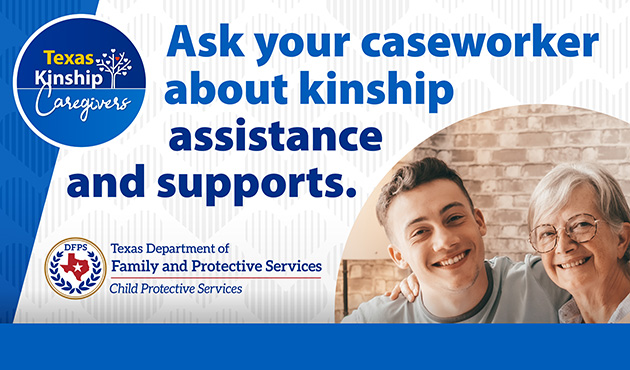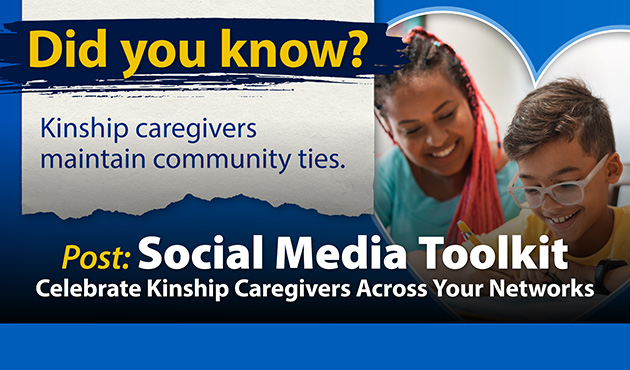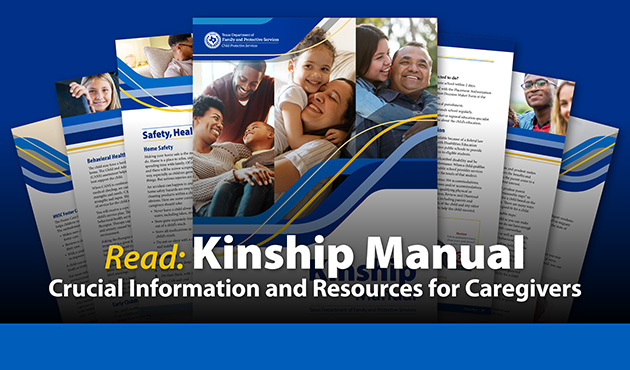Children who cannot safely reside with their parents do best, have better outcomes, and feel safer when they are placed with relatives or fictive kin like a family friend, neighbor, or teacher.
Support for Kinship Caregivers
DFPS updated policy (CPS Handbook 3221 and 6123) to require staff to have the family help identify all grandparents and other adult relatives, not just three relatives who might be considered for placement. A notification form letter was developed with attachments regarding the notice of removal and options to become a:
- Kinship foster parent.
- Kinship unverified caregiver.
- Supporter of the child in placement by participation in the service planning for the child.
Prospective or current kinship caregivers can pursue foster home verification if they are interested in supporting a child in care who is placed in their home, regardless of the child’s permanency plan.
To remove many of the barriers kinship caregivers have to address while going through the verification process, Health and Human Services developed separate kinship standards specifically for kinship caregivers. These separate standards allow kinship caregivers to become verified more easily while focusing on the child’s safety and well-being.
Becoming a verified foster home provides additional financial assistance while caring for a child. However, foster care placements are meant to be a temporary arrangement until the permanency plan can be achieved for the child.
Financial Assistance for Kinship Caregivers
You may qualify for assistance if you are a kinship caregiver and the child is in the temporary or permanent managing conservatorship, (legal custody), of the state of Texas.
The Relative and Other Designated Caregiver payment, also known as RODC payment is a monthly reimbursement, half of the foster rate, made to eligible kinship caregivers.
RODC eligibility includes:
- The Kinship Caregiver Home Assessment must be approved.
- The caregiver has signed the Kinship Caregiver Agreement.
- The caregiver has begun the Kinship Caregiver Training.
- The caregiver's family net income does not exceed 300% of the federal poverty limit.
Kinship Placement Assistance helps with the cost of a child's initial placement or to support the placement from breaking down.
- One-time Assistance, based on the need of the kinship family.
- Refer to your kinship worker to process the assistance.
Kinship Verification Reimbursement helps families with the costs associated with becoming a verified kinship foster home.
- One time Assistance, after verification has been completed.
- Refer to your kinship worker to process the assistance.
Permanency Care Assistance provides benefits to a relative or fictive kin (close family friend, etc.) when those people otherwise might be unable to care permanently for children in DFPS’ managing conservatorship.
To receive Permanency Care Assistance for a child, a prospective permanent managing conservator must meet all the following eligibility criteria:
- Become verified as a foster parent (see information below for relative or fictive kin requirements).
- Serve as the child’s foster parent for at least six consecutive months before becoming the child’s permanent managing conservator.
- Enter into an agreement for PCA before the court grants permanent managing conservatorship of the child.
- Become the permanent managing conservator of an eligible child after the agreement for PCA is signed.
Enhanced Permanency Care Assistance provides additional supports to a relative or fictive kin (close family friend, etc.) that qualifies for PCA and is caring for a child that has either an intense or specialized level of care.
To be eligible for enhanced permanency care assistance, the child must meet each of the following criteria BEFORE the signing of the permanency care assistance agreement.
Criteria the child must meet for Enhanced PCA:
- The child must be in the managing conservatorship of DFPS.
- The child must have an authorized service level of Specialized or Intense to include Single Source Continuum Contractor (SSCC) equivalent. (The child also meets this requirement if the child had such an authorized service level immediately before being placed in a facility or home operated or regulated by another state agency.)
The child must also be living in one of the following:
- A foster care home that is regulated by Child Care Licensing and is approved under licensing minimum standards to provide treatment services.
- A home operated or regulated by another state agency, in Texas or in another state, that provides comparable treatment services.
About Kinship Care
For generations, extended families have played significant roles in rearing children when parents are having a difficult time. This is called Kinship Care by Child Protective Services (CPS). Relatives and other people who the child or family have a significant relationship can often provide children with stability when they can't live with their birth parents.
When children have been abused or neglected, DFPS may remove them from their homes to ensure their immediate safety. The courts are required to consider a temporary placement with a relative and ask the parents to tell DFPS how to contact relatives who may be able to care for their children at least temporarily.
When placing children, the court considers their needs as most important. Often a Family Group Decision Making (FGDM) conference is held and everyone involved recommends a particular family member or friend is the best place for the child. The placement may be court ordered, usually after DFPS completes a home assessment to make sure it's safe and appropriate for the child. CPS also takes the parents' desires into account whenever possible. If placement with a kin caregiver not available or appropriate, the child may be placed in foster care.
- Provides love and care in a familiar setting;
- Provides parents with a sense of hope that children will remain connected to their birth families;
- Enables children to live with people they know and trust;
- Reinforces a child's sense of cultural identity and positive self-esteem;
- Helps a child make and sustain extended family connections;
- Continues lifelong family traditions and memories;
- Supports the child in building healthy relationships within the family;
- Supports the child's need for safety and well-being; and
- Creates a sense of stability in the life of a child.



